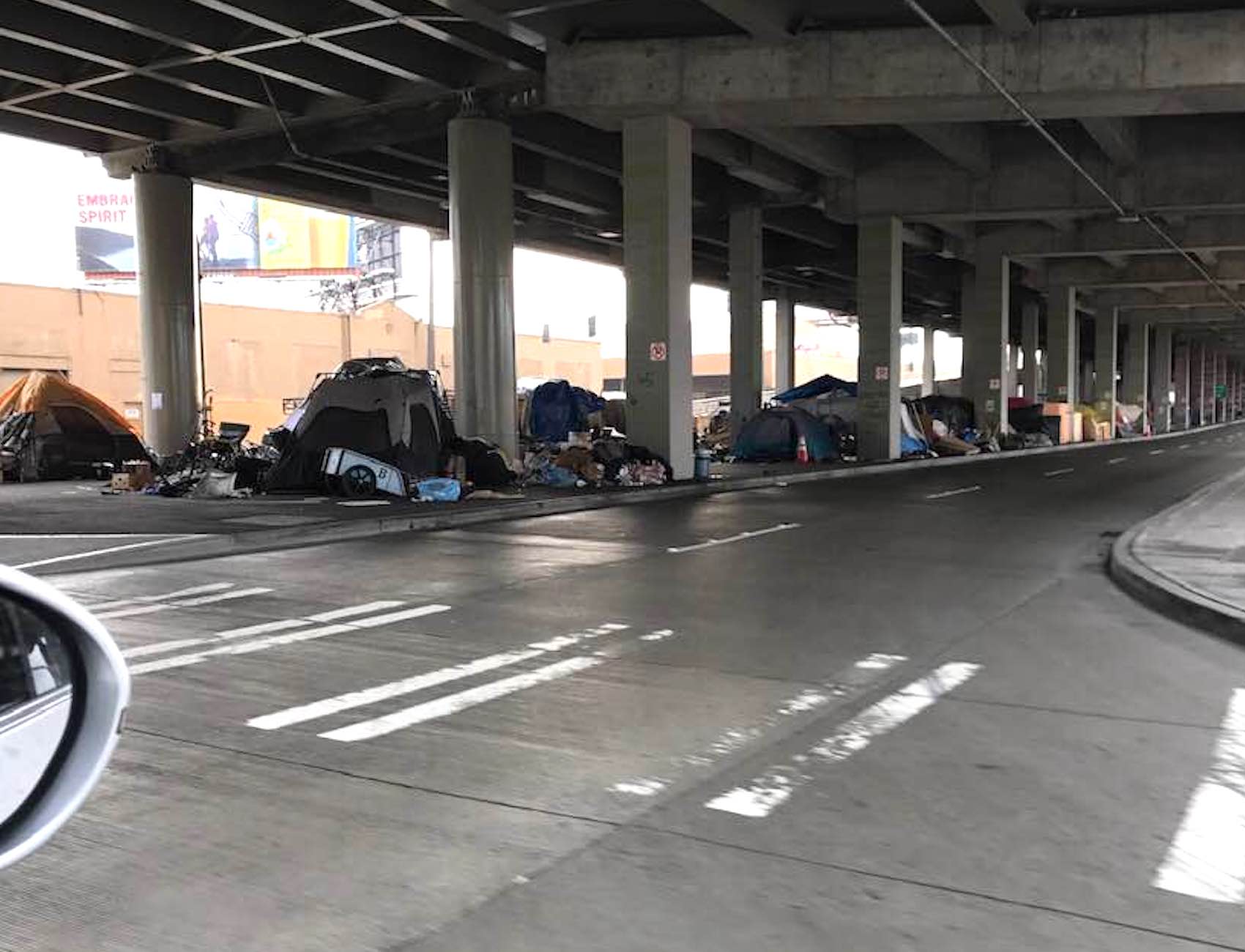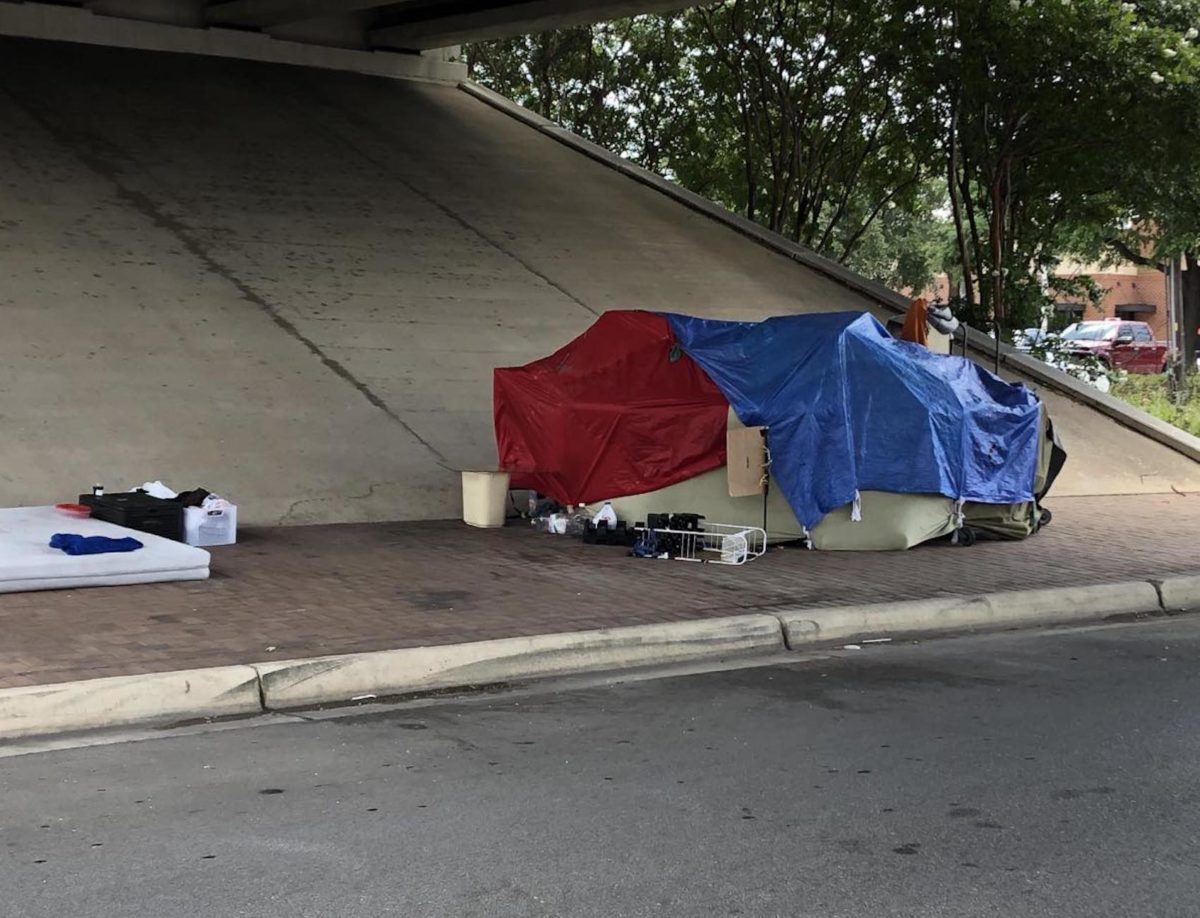Austin Braces As Texas Officials Plan Crackdown On Homeless Encampments
Last week, the City Council reinstated a “no camping” ordinance meant to discourage people experiencing homelessness from sleeping on sidewalks and outside a shelter. Advocates say the city is criminalizing poverty.

Xavier Garrett was napping outside, waiting for a library to open, when he woke up to a ticket. Austin, Texas, police cited him, he said, for violating a municipal ordinance meant to discourage people from sitting or sleeping in public areas of the city.
Years before, in 2010, police ticketed Garrett for violating the city’s no-camping ordinance. In the process of settling that ticket in January of this year, he temporarily lost the driver’s license he needed to keep his food delivery job.
Garrett, who is now living with his girlfriend, said he experienced homelessness for the first time in Austin, where he has slept in his car and at a shelter, but also on the streets and at an encampment. “If you’re on the streets downtown and you have nowhere to go, then you get penalized,” he told The Appeal.
In June, the Democrat-controlled City Council voted to amend the ordinances on homelessness, effectively lifting bans on sitting or lying on public sidewalks, panhandling, and camping. As a result, city police were instructed to stop issuing citations or making arrests for these offenses, as long as individuals were not posing a clear threat to themselves or the public.
But last week, the City Council passed an ordinance reinstating the camping ban on all sidewalks and around a downtown shelter, following a record number of resident complaints. Sitting or lying down is also banned outside the shelter but is allowed up to 15 feet from an open business or residence. The city is set to begin enforcing the camping ban on Monday.
Governor Greg Abbott, a Republican, has also said that he will send in state transportation workers to clear out overpass encampments if the city did not do it by Nov. 1. Abbott’s office has also said it would, “if necessary,” send state troopers “to enforce the state law prohibiting trespassing,” according to a letter sent to Mayor Steve Adler.
If the city begins issuing more citations, making arrests, or jailing campers, it will create even more barriers to housing and employment for people experiencing homelessness, said Chris Harris, an activist with Homes Not Handcuffs, a coalition in Austin that pushed city officials to change the way police dealt with the chronically homeless population.
“Criminalization on its own is very counterproductive with actually helping people get off the streets,” said Harris. “People come out of jail worse than they were before, less prepared to turn their life around, to get housing or get job opportunities.”
On any given night in Austin, a city with roughly one million residents, there are about 2,200 people experiencing homelessness. That’s more people sleeping in shelters or on the streets per capita than other large Texas cities, according to a recent report by the Ending Community Homelessness Coalition (ECHO), a group that tracks homelessness in Travis County.
There are also clear disparities in who is homeless. Black individuals, who make up 8 percent of the population in Travis County, represent 34 percent of people experiencing homelessness, ECHO reported. White individuals make up 49 percent of the county population and account for 41 percent of those experiencing homelessness.
In recent months, large encampments underneath overpasses and outside the Austin Resource Center for the Homeless, the city’s main downtown shelter, have become a flash point. Resident complaints and a widely shared video from earlier this month—depicting a violent confrontation between a motorist and an allegedly aggressive panhandler—have sparked a backlash against the City Council’s decision to revise the ordinances. A newly formed PAC, Our Town Austin, has mentioned homelessness issues in its effort to recall the mayor and some councilmembers. And Abbott has criticized the encampments as overcorrecting on homelessness at the expense of “public safety and common sense.”

Attempts to make Austin’s homeless policy a wedge issue has angered advocates, said Harris, who noted that some people experiencing homelessness have already faced arrest for trespassing as a result of the reinstated camping ban.
The governor and opponents of decriminalization “have no actual concern for people experiencing homeless, no desire to see them out of poverty, no resources that they want to dedicate to actually addressing that issue in a real way,” said Harris. “Their solution to this issue, as it was with immigration and as it is for most things, is simply police and prison.”
In a statement to The Appeal, a spokesperson for the city of Austin disputed Harris’s assessment. “We have a moral imperative to address this challenge,” the spokesperson said, noting that the city has launched a pilot program in partnership with homeless service providers to “survey and assess every individual living outside” of the downtown shelter and connect them with appropriate services. The City Council has also allocated an additional $17 million in its 2020 budget for programs meant to prevent eviction, avoid displacement due to inhabitability, and increase permanent affordable housing, the spokesperson said.
People who violate Austin’s homelessness ordinances on sitting or lying, panhandling, and camping can face a fine of up to $500 and a Class C misdemeanor. And between 2015 and 2018, nearly 6 in 10 homelessness citations—about 6,000—resulted in an arrest warrant for failure to appear in court, according to data analyzed by Austin public radio station KUT.
In its statement, the city of Austin said that people who come to the Downtown Austin Community Court for homelessness ordinance violations are given an opportunity to participate in case management services, in lieu of facing a fine. “Our goal is to help each individual achieve long term stability through addressing physical health issues, mental health issues, and substance use,” the city spokesperson said.
According to a report by Austin’s city auditor, only a small percentage of people issued citations under the homelessness ordinances actually receive services through the court system: For one, about one-third of people are issued citations through the Austin Municipal Court, which does not offer services for homeless people. And second, most people don’t show up for their court date, according to the report. If they do, help may not be immediate. At the Downtown Austin Community Court, there is currently a waitlist for case managers who provide services such as housing placement, drug counseling, and mental health treatment, a community court staff member confirmed to The Appeal.
“Most people would tell you that giving people help through the criminal justice system isn’t ideal,” said Emily Gerrick, senior staff attorney at the Texas Fair Defense Project in Austin. “This system really breeds distrust because the first step to receiving services is a police interaction.”
Austin has become emblematic of the national crisis in housing. For eight years straight, it has been the fastest-growing metro area in the U.S., driven in part by a surge in tech start-ups relocating to the city and pushing up the cost of housing.
As a result, the city’s housing stock is depleted: According to the report released by ECHO in March, the city’s shortfall includes 2,585 studios or one-bedroom apartments for people who need affordable housing. The city’s shelters had about 1,300 emergency and transitional beds in 2017.
Advocates say that passing background checks for apartments and jobs can be much more difficult for people who have been cited or arrested under the ordinances. That was the case for Garrett. He arrived in Austin, from his hometown of Houston, about 10 years ago to pursue a degree in video game programming at the city’s community college. But the wages he earned in a fast-food job weren’t enough to keep a roof over his head, finish school, and earn the six-figure salary he dreamed of making as a programmer.
“I just couldn’t get any good opportunity in my field,” Garrett, now 31, told The Appeal. “I’ve been in fast food my whole life, and there is not much room to really get ahead.” Because Garrett bounced sporadically between Austin and Houston, he never appeared in court to answer his 2010 camping ticket. A warrant was issued for his arrest in 2011, but the ticket wasn’t resolved until January of this year, according to municipal court records.
Garret said he felt “stuck in the circumstances” and questioned whether Austin officials knew how to help anyone out of homelessness. “If they’re trying to help people by giving them tickets, they’re not doing a very good job,” he said.
Austin is far from the only U.S. city struggling to address the growth of homeless encampments, said Maria Foscarinis, founder and director of the National Law Center on Homelessness & Poverty. According to the center’s research, there has been a 1,342 percent increase in the number of unique homeless encampments reported by media outlets, from 19 reported encampments in 2007 to 274 reported encampments in 2016.
In San Francisco, some residents who accused the city of inaction on homeless encampments lined sidewalks with large boulders to prevent formation of campsites in September. Nearby in Oakland, California, police were dispatched to oversee crews as they dismantled a camp near an interstate overpass on Oct. 15.
Although encampments in the District of Columbia, San Francisco, and Los Angeles have garnered more coverage because of their size—the populations typically range from 50 to 100 people in tent cities—those that exist elsewhere have become semi-permanent fixtures that can’t be eradicated by simply dispatching police and summoning people to court, Foscarinis told The Appeal.
“The solution to homelessness is housing,” she said. “It’s more cost effective than deploying the criminal justice system.”
Correction: An earlier version of this article misstated some details of the homelessness ordinance passed by the Austin City Council on Oct. 17.
